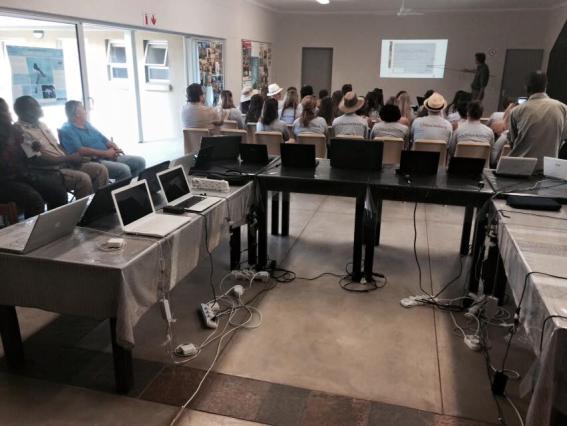Isenberg Students Explore Service, Business, and Culture in South Africa
June 30, 2015
“We want to do more service projects!” was the verdict of 18 Isenberg students who visited South Africa a year ago as part of the first-time course, Ubuntu & Business in South Africa. Last month, 30 like-minded students fulfilled that wish during the second annual three-week trip to Johannesburg, Pretoria, Cape Town, Soweto and Kruger National Park.

Community Service in Spades
Following in the footsteps of their predecessors, the Isenberg group planted shade trees at a grammar school in Cape Town. (Shade is a precious commodity in that predominantly flat, sun-drenched terrain.) Armed with shovels, mulch, and saplings, the visitors worked in teams of four with sixty 4th, 5th, and 6th graders. The Isenberg students bonded with the children through work, games, and conversation.

“The trip’s service component allowed us to connect with South Africa on a deeper level,” observed graduating senior Amanda Grassia ’15. “We worked side by side with South African children and adults; I got so much value just from talking with them.” A second Isenberg senior, Ari Wigdor ’16, concurred.
“I will remember my relationships with those who benefited from our work. There was nothing abstract about that. It was personal contact and true cultural immersion.”
Earlier in the trip, in Soweto, the Isenberg visitors planted a sustainable vegetable garden at the Othandweni Family Care Center, an orphanage with 90 children. The Center, which houses children ranging from newborns to 18 year-olds, includes a nursery, residential cottages, a library, an activity center, and counseling and support services. “Feeding those 90 children year-round is a formidable challenge for the orphanage,” noted Christina Monte, who co-taught the Ubuntu course with Michael Schurter.* “We planted cabbage, onions, carrots, and lettuce—mostly hardy winter vegetables). It’s amazing how much thirty focused students can accomplish in several hours.”

“Timbavati serves 18 primary schools and 32 high schools,” Monte remarked. “The computers will jump start a program that brings computer literacy to neighboring schools and communities. The Foundation has set up a training center with our donations. IT-literate trainers will teach the area’s teachers to use them. In future visits, Isenberg students—all are digital natives—may help in that and in outreach to surrounding communities.”
Citizens First
The three service projects fit seamlessly into Isenberg’s Citizens First Program, which fosters student-directed community service. “Our aim is to encourage responsible citizenship and habits of helpfulness in one’s home or residence hall, community, and business,” observed Isenberg Undergraduate Dean Linda Shea, who joined the students for much of the South Africa trip. In May, Shea presented the first three Citizens First certificates of completion to graduating seniors at Isenberg’s annual graduation ceremony.
South African Business and Culture
The lion’s share of the South Africa trip explored business and cultural venues that complemented a semester in the classroom. The students toured sites in and around Johannesburg and Cape Town. They explored the capital city, Pretoria, and Soweto township—ground zero for the anti-apartheid movement. And they visited Robben Island, where Nelson Mandela spent 18 years in prison. In addition, they met with entrepreneurs, ad agency strategists, and a Partner from the accounting firm, Deloitte. They toured the Cullinen diamond mine (the world’s largest), and went on safari in Kruger National Park, spending quality time with speakers who dissected the market dynamics of the illegal rhino horn trade. And they went behind the scenes at the sprawling Fairview Wine and Cheese Estate, where owner Charles Back described a business model that emphasizes sustainability and markets 70% of the company’s wine overseas.

In Praise of Economic Resourcefulness
The Isenberg students saw ample evidence of South Africa’s vibrant economy—Africa’s second largest and a player in global markets. But they also witnessed wide disparities in living standards, reflecting an economy of contrasts. And they observed innovative, entrepreneurial solutions to counterbalance scarce resources.
They discovered, for example, the Consol Jar, which resembles a large Mason jar, but with a lid with a mini solar panel and a hidden battery. Power outages, observed Michael Schurter, are commonplace; not all South Africans can afford to purchase diesel-powered generators. Instead, they leave solar jars out by an open window all day to charge, and when the power goes out, flip the switch, which triggers LED lights that fill the jar for up to six hours. “It’s one of many brilliant little South African adaptations,” Schurter remarked. “And inspiration, I hope, that might spark our students’ own ideas for business innovation.”
Trip coordinators Monte and Schurter thank DJ du Preez for his expert guidance on the trip, including his identification of service opportunities.